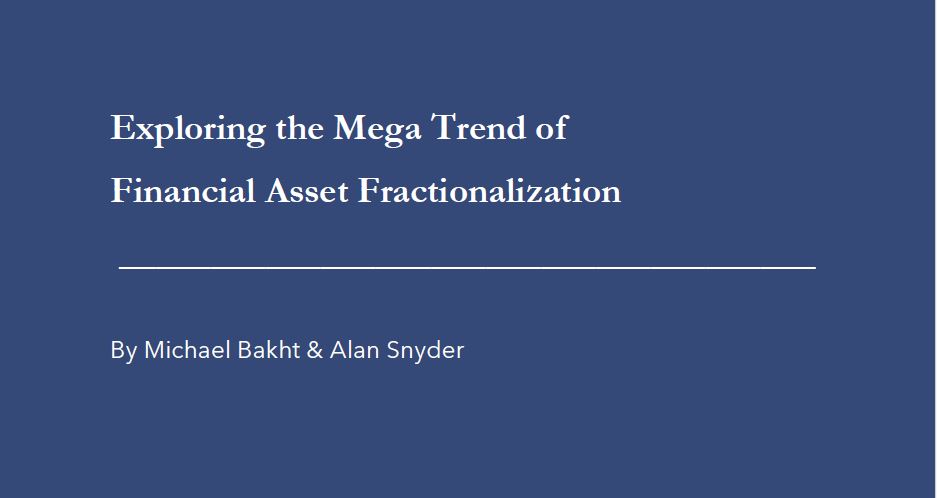Top Industries for Fractional Investing
Fractional investing is rapidly transforming the way individuals and businesses invest in high-value assets. This innovative model allows multiple owners to share ownership of an asset, reducing costs while maximizing usage and benefits. Traditionally associated with real estate, fractional ownership is now making waves in industries like private aviation, luxury yachting, exotic cars, and even fine art.
As high-net-worth individuals (HNWIs) and savvy investors seek more efficient ways to access luxury and investment-grade assets, fractional ownership is emerging as a practical and financially sound solution. In this article, we explore the top industries where fractional ownership is gaining momentum and reshaping traditional asset ownership models.
1. Real Estate: A Pioneer in Fractional Ownership
The real estate sector has long been at the forefront of fractional ownership, making it one of the most well-established applications of this model.
Vacation Homes and Second Properties
Owning a vacation home outright can be expensive, especially when considering maintenance, property taxes, and upkeep costs. Fractional ownership allows multiple buyers to co-own a luxury vacation property, sharing expenses while enjoying scheduled usage throughout the year. Platforms like Pacaso and Inspirato Real Estate have popularized this model, making high-end vacation homes more accessible.
Commercial Real Estate Investment
Investors looking to enter the commercial real estate market without massive capital outlays increasingly turn to fractional ownership. Real estate crowdfunding platforms, such as Fundrise and CrowdStreet, enable investors to buy shares in income-generating properties, such as office buildings, multifamily apartments, and retail spaces. This democratization of real estate investing has opened doors for smaller investors to access lucrative opportunities previously reserved for institutional buyers.
Luxury Condominiums and Urban Residences
In major cities, luxury condos with high price tags often remain out of reach for many buyers. Fractional ownership allows investors or individuals to co-own high-end properties in prime locations, offering them access to premium residences at a fraction of the cost.
2.Private Jets: A Smarter Way to Fly
The private aviation industry is another sector where fractional ownership is gaining significant traction. Owning a private jet outright comes along with hefty acquisition costs, maintenance, insurance, and crew expenses. Fractional ownership provides an alternative for individuals and businesses who want the luxury and convenience of private aviation without full ownership burdens.
How It Works
Fractional jet ownership programs, such as NetJets, Flexjet, and PlaneSense, allow clients to purchase a percentage share of a private jet. In return, they receive a set number of flight hours per year, along with access to a fleet of aircraft when needed.
Key Benefits
- Cost Efficiency: Owners share operational costs, reducing financial strain.
- Availability: Owners can book flights as needed without managing maintenance.
- Convenience: No need for full-time crew, maintenance scheduling, or regulatory compliance.
As demand for private travel continues to grow — especially post-pandemic—fractional ownership in aviation is expected to remain a preferred model for frequent fliers who value flexibility and exclusivity.
3.Yachts: Luxury Boating Without Full-Time Costs
Yacht ownership is synonymous with wealth and prestige, but the reality of full ownership is often impractical. Between docking fees, maintenance, insurance, and crew salaries, the costs can be staggering. Fractional ownership is revolutionizing the luxury yacht industry, allowing multiple owners to co-own high-end vessels while sharing expenses.
How It Works
Companies like YachtLife, SmartYacht, and SeaNet offer fractional yacht ownership programs. Participants invest in a percentage of a yacht and receive guaranteed usage days per year. Some programs even include professional crew management, maintenance, and concierge services.
Why It’s Popular
- Lower Financial Commitment: Fractional ownership significantly reduces acquisition and upkeep costs.
- Flexible Usage: Owners book trips based on availability without worrying about year-round maintenance.
- Access to Multiple Destinations: Some programs offer access to different yachts across global locations.
With the rise of "experiential luxury," more individuals are choosing to co-own yachts rather than bear the financial responsibility alone.
4. Exotic& Luxury Cars: Supercars Without Full-Time Ownership
High-end vehicles such as Ferraris, Lamborghinis, Rolls-Royces, and McLarens are dream purchases for many car enthusiasts. However, depreciation, insurance, and maintenance costs can make full ownership impractical. Fractional ownership programs provide a solution, allowing car lovers to access these vehicles without the full financial burden.
How It Works
Companies like Curated and Classic Car Club Manhattan offer fractional ownership programs where participants buy shares in a fleet of luxury and exotic cars. Members then schedule usage based on their ownership stake, rotating through different models throughout the year.
Advantages
- Diverse Access: Owners can experience a variety of high-end vehicles.
- Cost Efficiency: Expenses are split among multiple owners.
- No Maintenance Hassle: The service provider handles repairs, insurance, and storage.
For those who love driving exotic cars but don’t want the commitment of full ownership, fractional car ownership provides the perfect solution.
5. Fine Art & Collectibles: Investing in Masterpieces
Fine art has long been considered a valuable investment, but acquiring works by renowned artists like Picasso, Banksy, or Monet often requires millions of dollars. Fractional ownership is now making art investment more accessible to a broader range of investors.
How It Works
Platforms such as Masterworks allow investors to purchase fractional shares in high-value artworks. These works are then held for appreciation, and investors can sell their shares later for potential profits.
Why It’s Gaining Popularity
- Affordability: Investors can own a portion of a masterpiece rather than buying it outright.
- Diversification: Art serves as an alternative investment to hedge against market volatility.
- Passive Investment: Owners don’t need to worry about maintenance, security, or resale logistics.
With the increasing demand for alternative investments, fractional ownership in fine art is expected to grow as more investors look for stable, high-value assets.
6.High-End Vacation Clubs & Resorts
Luxury travel experiences are another area where fractional ownership is making an impact. High-end vacation clubs like The Ritz-Carlton Destination Club and Exclusive Resorts offer members fractional access to a portfolio of luxury homes and resorts worldwide.
How It Works
Instead of purchasing a single vacation property, members buy into a shared pool of residences and book stays at different locations each year. This provides flexibility without the hassle of property maintenance.
Benefits
- Global Access: Owners can enjoy vacations in multiple destinations.
- Predictable Costs: Expenses are divided among members.
- No Property Management: The program handles upkeep and hospitality services.
For frequent travelers who desire luxury without long-term ownership responsibilities, fractional vacation clubs offer the ideal balance.
Full benefits with a fraction of the cost and risk
Fractional ownership is reshaping the way individuals and investors approach high-value assets. From luxury real estate to private aviation, yachts, exotic cars, fine art, and beyond, this model provides access to premium assets without the full financial burden.
As technology advances and consumer behavior shifts towards shared economy solutions, fractional ownership will likely continue its expansion into new industries. Whether for personal enjoyment or as a strategic investment, fractional ownership offers a cost-effective and flexible alternative to full ownership.
For investors and luxury enthusiasts alike, embracing fractional ownership can open doors to exclusive assets and experiences without the traditional financial constraints.








Leave a Comment